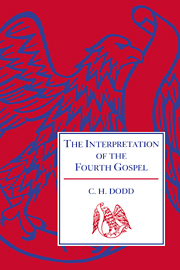Book contents
- Frontmatter
- Contents
- PART I THE BACKGROUND
- 1 The setting in early Christianity
- 2 The higher religion of Hellenism: the Hermetic literature
- 3 Hellenistic Judaism: Philo of Alexandria
- 4 Rabbinic Judaism
- 5 Gnosticism
- 6 Mandaism
- PART II LEADING IDEAS
- PART III ARGUMENT AND STRUCTURE
- APPENDIX: Some considerations upon the historical aspect of the Fourth Gospel
- Index Locorum
- Index Nominum
3 - Hellenistic Judaism: Philo of Alexandria
from PART I - THE BACKGROUND
Published online by Cambridge University Press: 10 December 2009
- Frontmatter
- Contents
- PART I THE BACKGROUND
- 1 The setting in early Christianity
- 2 The higher religion of Hellenism: the Hermetic literature
- 3 Hellenistic Judaism: Philo of Alexandria
- 4 Rabbinic Judaism
- 5 Gnosticism
- 6 Mandaism
- PART II LEADING IDEAS
- PART III ARGUMENT AND STRUCTURE
- APPENDIX: Some considerations upon the historical aspect of the Fourth Gospel
- Index Locorum
- Index Nominum
Summary
We have seen that the kind of religious philosophy propagated in the Hellenistic world by such writings as the Hermetica owed something to the influence of Judaism and of the Old Testament. In the easy give and-take of civilized and intellectual life in the period, the influence was reciprocal. Hellenistic Judaism is a distinct phenomenon of the time. That the Fourth Evangelist expected to find readers among open-minded Jews who participated in the intellectual life of Hellenism we may take for granted. If we can discover what was in their minds, we may hope, here too, to find pointers to the meaning which the Fourth Gospel was intended to convey to its primary public.
The best known and most representative figure of Hellenistic Judaism is Philo of Alexandria, whose voluminous works enable us to form a fairly comprehensive estimate of the kind of religious philosophy which emerged within Judaism from the cross-fertilization of Hebrew and Greek thought in the cosmopolitan atmosphere of the great centre of Hellenistic culture in Egypt. If some recent critics are right in holding that much in the works of Philo is simply ‘lifted’ from earlier sources, they are not for that reason less valuable as evidence for our purpose.
Philo appears in his works as a loyal Jew—at least in intention—for whom the Scriptures of the Old Testament had absolute authority. But he is so steeped in Gentile thought—mainly in the popular Platonic-Stoic philosophy which meets us also in the Hermetica—that the Scriptures naturally interpret themselves to him in its terms.
- Type
- Chapter
- Information
- The Interpretation of the Fourth Gospel , pp. 54 - 73Publisher: Cambridge University PressPrint publication year: 1953



